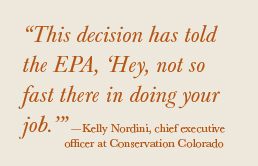
A recent ruling by the Supreme Court limits the Environmental Protection Agency’s authority to regulate greenhouse gas emissions at electric utilities’ power plants. Environmentalists worry that ultimately the decision will also hamstring the federal government’s ability to restrict a variety of toxic pollutants emitted at fossil fuel plants, like Suncor Energy’s oil refinery in Commerce City. Front Porch photo by Christie Gosch
The U.S. Supreme Court’s ruling that limits the authority of the Environmental Protection Agency (EPA) to regulate greenhouse gas emissions is a huge setback for mitigating climate change across the country, according to Colorado conservationists, public policy experts, and state and local officials. Kelly Nordini, chief executive officer at Conservation Colorado, says the impacts will be felt by everyone. “Colorado is on the front lines of our climate reality with wildfires, drought, extreme weather and all of the health and economic impacts that come with that. So, when the Supreme Court limits our tools in addressing those challenges, Coloradans are going to feel it.”
Grace Rink, who leads the Climate Action Office for the City of Denver, agrees. “The Court has rendered the EPA impotent to take any substantive action to protect our cities, towns, and communities from the ravages of the climate crisis,” she wrote in an email.
By a 6-3 margin, the Court ruled that the EPA didn’t have the authority to force electric utility companies to shut down coal-fired power plants and transition to renewable energy, such as solar or wind. It is considered the most significant climate ruling in more than a decade, although it was in response to the Obama Clean Power Plan that never went into effect because it had been held up in the courts and then thrown out by President Trump.
Tanya Heikkila, professor of environmental policy at the University of Colorado, Denver and a Park Hill resident, says the lawsuit was initiated by West Virginia and other politically-conservative states that were scrambling to comply. “But Colorado was already ahead of the game. We were in compliance with what the Clean Power Plan set out to do, and a lot of that was due to Xcel Energy’s efforts to move to renewables on a fairly aggressive time scale relative to what other utilities across the country were doing.”

Tanya Heikkila, professor of environmental policy at UCD and Park Hill resident, says the Court’s ruling is a huge setback in fighting climate change. Front Porch photo by Christie Gosch
Still, Coloradans are at risk because greenhouse gas emissions don’t respect state borders. “We don’t have a consistent policy in the United States, so Colorado’s efforts are going to be a drop in the bucket when so many states aren’t doing anything. This is a global problem, and if we don’t have good national and international policy, we’re not going to solve the problem.”
Heikkila doesn’t think Colorado is likely to reverse course on its climate initiatives anytime soon, and a statement released by Governor Jared Polis immediately after the Supreme Court decision seems to confirm that. “We have already locked in the closure of Colorado’s coal plants no later than 2031 because they produce the highest cost electricity. To save people money, we are rapidly moving to low- cost solar and wind energy and today’s decision does not affect our plans.”
The governor’s statement goes on, however, to express concerns about the broader reaches of the Court’s ruling, saying the “decision does narrow the ability of the federal government to take common sense steps to protect the air we breathe.” It is those broader issues that concern Nordini. “This decision has told the EPA, ‘Hey, not so fast there in doing your job.’ That has a chilling effect and could have huge impacts for things that Coloradans care about: clean air and clean water first and foremost.”
Just two weeks after the Supreme Court’s ruling, details emerged about Suncor Energy’s effort to ask the EPA for permission to increase toxic emissions by 90 tons, including nitrogen oxides, carbon monoxide, and particulate matter at two of its plants in Commerce City. One refines oil into gasoline and the other produces asphalt for road construction.
 Seeking permission to further pollute Colorado’s air has outraged environmental groups like 350 Colorado. Heidi Leathwood is a climate policy analyst for the grassroots organization. She says she expects more companies will seek such waivers in the future following the Court’s decision. “I think across the board this decision weakens the ability for the EPA to regulate toxins and co-pollutants. I think there has long been an agenda by the far right to do just that, and this ruling sets a really bad precedent.”
Seeking permission to further pollute Colorado’s air has outraged environmental groups like 350 Colorado. Heidi Leathwood is a climate policy analyst for the grassroots organization. She says she expects more companies will seek such waivers in the future following the Court’s decision. “I think across the board this decision weakens the ability for the EPA to regulate toxins and co-pollutants. I think there has long been an agenda by the far right to do just that, and this ruling sets a really bad precedent.”
Climate officer Rink also worries about the wider ramifications. “This ruling will definitely have a drastic and negative impact on communities of color, Indigenous people, under-resourced communities, people living with chronic health conditions, babies, children, and older adults. Only the EPA can regulate the major polluters whose industrial emissions degrade the quality of the air we breathe, and it is a documented fact that more of these sources are located in communities of color and where people with low incomes live.”
The Supreme Court decision indicated that the only way the EPA can regulate greenhouse gas emissions broadly is for the U.S. Congress to pass legislation giving the agency that authority. “If people want to make change, they need to advocate for congressional mandates so the EPA has clear authority to move forward on climate change strategies. Call your representatives and senators. More public pressure is our best hope,” says Heikkila.
She also says the Biden administration may find creative ways to sidestep the ruling and effectively limit greenhouse gases by putting stringent controls on other pollutants. Still, those efforts could be completely reversed by a new administration. “The only long-lasting solution is for Congress to act,” says Heikkila.
Rink is more pessimistic. “The Court is well aware that most members of Congress don’t and never will have the scientific background to make such determinations, which is why it delegated that decision-making process to the administrative agencies in the first place.”
Leathwood says her organization is going to continue to advocate for even broader restrictions. She would like to see leaders at both the state and federal levels move more quickly to end fossil fuel production altogether. “We can’t just talk about stopping pollutants. The only way to dramatically reduce carbon emissions is to end our reliance on fossil fuels. We should be reducing oil and gas production, not ramping it up.”


0 Comments